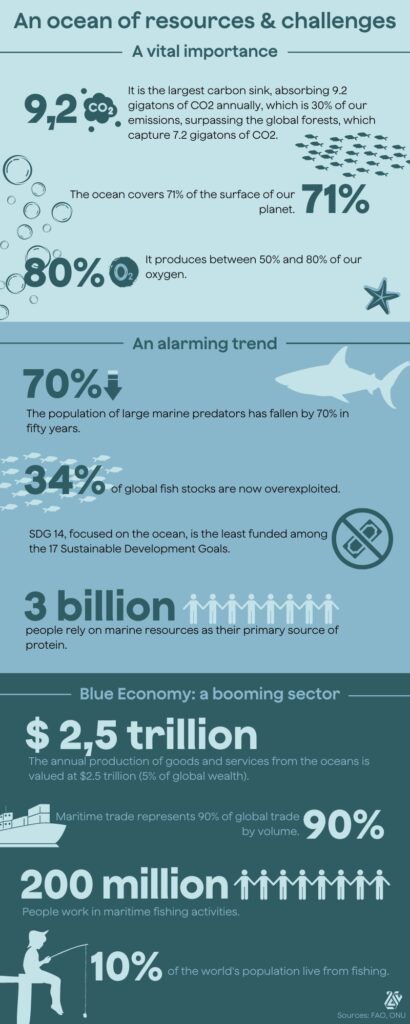
A Vital Importance
The ocean is not just a body of water; it is the lifeblood of our planet. Covering 71% of the Earth’s surface, it plays an indispensable role in sustaining life. It is the world’s largest carbon sink, absorbing 9.2 gigatons of CO2 annually – that’s 30% of our global emissions. This staggering capability surpasses the carbon capture of all the world’s forests combined. Furthermore, the ocean generates between 50% and 80% of our oxygen, a fundamental element for life on Earth.
An Alarming Trend
Despite its crucial importance, the ocean is under severe threat. Rising temperatures due to climate change are affecting marine life and ecosystems daily. The depletion of marine biodiversity is alarming: overfishing has led to 34% of global fish stocks being overexploited, and the populations of large marine predators have plummeted by 70% in the past fifty years. Our dependence on the ocean is undeniable, with 3 billion people relying on marine resources as their primary source of animal protein. Yet, despite these critical issues, Sustainable Development Goal 14 (SDG 14), which focuses on conserving and sustainably using the oceans, is the least funded of all the 17 SDG.
Blue Economy: A Booming Sector
The ocean is not only a vital environmental asset but also a powerhouse of economic activity. The Blue Economy, encompassing all ocean-related industries, generates an annual value of $2.5 trillion, contributing to 5% of the world’s GDP. Maritime trade is the backbone of global commerce, with 90% of world trade by volume and 80% by value transported by sea. Astonishingly, 290,000 goods are shipped every second across the oceans. The Mediterranean alone handles 30% of global trade. Maritime transport is cost-effective compared to road transport, bolstering its dominance. The ocean also provides livelihoods for 200 million people engaged in maritime fishing, with 97% of these workers residing in developing countries. Fishing is a lifeline for 10% of the global population.

